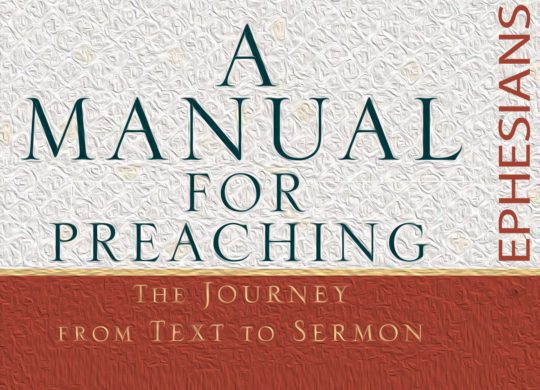Ephesians 2:11–22

Believers are “co-citizens” with the saints (Eph 2:19), an edifice “co-fitted” (2:21), and being “co-built” into a divine dwelling (2:22). This incorporation of all humans into one new body reconciled to God, i.e., the church, continues the grand design of God to consummate all things in Christ (1:10).
Believers united.
In stark contrast to their current status “in Christ Jesus” (2:13), the former status of unbelievers is described as being “without Christ” (2:12). This phrase forms the heading of the following list of related descriptors of unbelievers pre-Christ: excluded from “Israel,” the community of God’s people; “strangers to the covenants of promise”; hopeless; and Godless (2:12). In addition, those who were once “far” have now been made “near by the blood of Christ” (2:13)—this nearness is therefore a proximity to God, i.e., they are now the community of God’s people, believers in Christ. All who desired to be “near” could now come to God by faith in Christ. Ethnic and genetic division is thereby rendered null and void for the purpose of entering into a relationship with God in Christ.
Believers united and brought near, in contrast to the distance of unbelievers.
“Peace” takes plenty of space in this pericope—2:14, 15, 17 (×2), and there is “reconciliation” in 2:16, as well. Christ is shown as being peace (2:14), making peace (2:15), and proclaiming peace (2:17). He unifies “both” (2:14, 16, 18) and “two” (2:15) into “one”/“one new person”/“one body,” reconciling this unified body to God (2:14, 15, 16, 18). Thus all (believing) humanity has been brought near to God by Christ.
Believers united and brought near, in contrast to the distance of unbelievers, are reconciled in peace to God.
Jesus Christ unified humanity by “nullifying the law of commandments in decrees”—“the enmity” (2:14–15). Later, in 2:16, Christ is said to have reconciled mankind to God by “killing the enmity.” And this “enmity” is abrogated by Christ, “in his flesh” (2:14), “in himself” (2:15, 16), and “through the cross” (2:16). The “enmity,” then, is a single entity standing between the “far” and the “near” (2:14–16) and between man and God (2:16–18). So it can be nothing but the condemnation of sin announced by divine law. By the work of Christ, this “barrier” was removed (2:14): the “far” were joined to the “near,” and this unified body—all (believing) humanity—was reconciled as one new person/body to God. The grand benefits of salvation were wrought by Christ for all (believing) humanity, with no distinctions among them—an incredible part of the grand design of God to consummate all things in Christ.
Believers united and brought near, in contrast to the distance of unbelievers, are reconciled in peace to God. The work of Christ who removed the enmity—sin and its condemnation—that separated humanity among themselves (believers vs. unbelievers) and from God.
This was nothing short of a new “creation” of “one new person” (ktizō, “to create,” 2:15, always indicates the work of God). The idea of a new “creation” was already broached in 2:10, a sovereign work of God in Christ. Again, this is a significant move towards the magnificent plan of God to consummate all things—here, all people—in Christ (1:9–10), in a sense by redoing creation!
Believers united and brought near, in contrast to the distance of unbelievers, are reconciled in peace to God. The work of Christ who removed the enmity—sin and its condemnation—that separated humanity among themselves (believers vs. unbelievers) and from God: nothing short of a new creation of a single group of people in Christ.
The theme of the divine “household,” in particular, echoes through this pericope and is one of the key motifs here, reflected in the six compound words in 2:19–22 that are built off the syllable oik-, from oikos, “house”: paroikos (“alien,” 2:19), oikeios (“household,” 2:19), epoikodomeō (“build upon,” 2:20), oikodomē (“building,” 2:21), sunoikodomeō (“co-build,” 2:22), and katoikētērion (“dwelling,” 2:22). All humanity, without distinction, is invited to become part of the one household of God (2:19). And this new household—all believing humanity, i.e., the church—is becoming “a holy temple in the Lord” and “a dwelling of God in the Spirit.” What a privilege!
Believers united and brought near, in contrast to the distance of unbelievers, are reconciled in peace to God. The work of Christ who removed the enmity, sin, that separated humanity among themselves (believers vs. unbelievers) and from God: nothing short of a new creation of a single group of people in Christ—the household of God and a dwelling for God himself.
In a single sentence:
All (believing) humanity has been united in one body, the work of Christ removing the condemnation of the law for sin, winning access to God, and building believers together into a dwelling of God in the Spirit.











 Abe Kuruvilla is the Carl E. Bates Professor of Christian Preaching at The Southern Baptist Theological Seminary (Louisville, KY), and a dermatologist in private practice. His passion is to explore, explain, and exemplify preaching.
Abe Kuruvilla is the Carl E. Bates Professor of Christian Preaching at The Southern Baptist Theological Seminary (Louisville, KY), and a dermatologist in private practice. His passion is to explore, explain, and exemplify preaching.